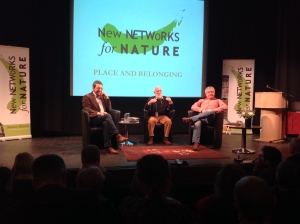As today’s opening of The World Forum on Natural Capital runs into a spot of bother over the antics of some of the Corporations who are promoting it, last week saw a scintillating debate about Natural Capital, between two crusty (in a good sense) old environmental campaigners Tony Juniper and George Monbiot. This has been written up elsewhere, eg on Mark Avery’s blog and by Mike McCarthy in the Independent. I’m looking forward to watching the debate again when the video is posted on the New Networks website.
This morning Prof Dieter Helm, Patron Saint of Natural Capitalists, posted a rather tetchy piece in the Guardian sustainable business section, huffing and puffing about why Monbiot is wrong and Natural Capital is the only way to “save” nature, or at least protect the renewable natural resources that humans depend on, in the language of economics. Leaving aside whether nature needs “saving” or not, Helm sounds like he is rattled – is he surprised that there is a kick back against his pet theory?
Helm advances some interesting arguments in favour of Natural Capital; for example he supports the notion of polluter pays and objects to the influence of perverse subsidy systems such as the Common Agricultural Policy.
He also promotes some absurd ones – such as the notion of aggregate natural capital. The idea is that as long as some arbitrarily measured level of total natural capital is maintained, it doesnt matter if one bit is lost, because another bit can be enhanced to make up the shortfall. This leads inexorably to biodiversity offsetting.
Helm also claims that the idea of nature having intrinsic value is “dangerous” which is rather bizarre language, especially from a Professor of Economics. Whether you believe nature has intrinsic value or not, the idea that it might have is only dangerous to people who are not entirely convinced by their own arguments.
Critically though Helm fails to address Monbiot’s counter-argument, which is that Natural Capital is a frame which forces us to think in narrow (and neoliberal) economic terms about nature and take actions as a consequence of that narrow economic thinking. This leads to things like the monetisation of the nature that can (at least in theory) be monetised, and the downgrading/dismissal of all that cannot be monetised. Helm is a fan of biodiversity offsetting, which is a good example of this monetisation approach, which I have explored many times before.
Tony Juniper also made Helm’s arguments at the New Networks for Nature conference last week. Juniper’s arguments were that a) adopting the moral argument had failed therefore we need to move on to an economic argument and b) that as regulation had failed to stop private sector businesses from damaging the environment, we should now work with them to help them adopt natural capital accounting, on a voluntary basis. But we know that voluntary approaches do not work without a strong regulatory framework to underpin them. In any case, while there may be some business leaders (early adopters) who are genuinely interested in doing natural capital accounting for the right reasons, there will be many more who are primarily driven by profit and will look for ways to circumvent the difficult stuff (like stopping the degradation of nature) while giving the public the impression they care. In that sense Natural Capital is Panglossion – in the best of all possible worlds it is a good idea. In our one it will be corrupted.
It was very ironic, no doubt accidental, that the Helm article in the Guardian should have been sponsored by premier private Swiss Bank Julius Baer. This bank is Switzerland’s 3rd largest “wealth management company” – yes it looks after the wealth of the worlds wealthiest people. Baer has recently been stung for $350M by the US Tax authorities for helping wealthy Americans hide their cash in tax havens like the Cayman Islands. Baer was also infamous in blocking access to the Wikileaks website, after a whistleblower revealed via wikileaks what the bank was doing helping the richest people on the planet to dodge paying taxes.
The idea of Natural Capital is based on the assumption that there will be an underlying ethical framework within which people and companies will operate. Julius Baer’s attitude towards the public good known as tax would suggest that ethical framework may be rather weak (to say the least).
The flaws in Helm’s approach to Natural Capital are very eloquently explored by Professor Sian Sullivan in this recent piece, which I recommend anyone interested in Natural Capital to read. And more information on framing can be found here.


Pingback: More tales from Natural Capital Wonderland: Woodlands and Badgers | a new nature blog
Pingback: Ecosystem Services for whom? | a new nature blog
Pingback: 2nd World Forum on Natural Capital | GreenHeaded
Pingback: Earthwatch Natural Capital debate today: Does nature come with a price tag? | a new nature blog
Pingback: Ecosystem Services for Whom? | Wrong Kind of Green
Pingback: Open Letter on World Forum on Natural Capital – Bella Caledonia